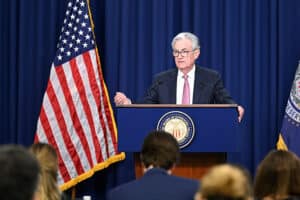
Fed Chair Jerome Powell discusses the Federal Reserve's interest rate hike with reporters at a May 4, 2022 press conference. Federal Reserve photo
In the wake of the Federal Reserve’s decision to move forward with its long-hinted-at half-percent interest rate hike, two leading real estate industry economists said they don’t expect the recent rapid rises in mortgage rates to continue through to the end of the year, even as the central bank telegraphed its intent to keep raising rates as it tries to clamp down on inflation.
The Fed’s decision was no surprise to bond markets, which play a large role in setting mortgage rates; National Association of Realtors Chief Economist Lawrence Yun described it to Banker & Tradesman as having already been “all priced in” by traders.
“This change had been telegraphed clearly in recent speeches. The statement also repeated the language that the committee ‘anticipates that ongoing increases in the target range will be appropriate.’ In other words, we are far from done at this point,” Mortgage Bankers Association Chief Economist Mike Fratantoni said in a statement, adding that he expects the federal funds rate to hit 2.5 percent this year.
The rate currently sits at 1 percent. Fed Chair Jerome Powell confirmed in a press conference following the rate increase announcement Wednesday that the central bank was considering additional half-percentage-point rate increases, but was not considering a rumored three-quarter-point increase, good news that sent stock indexes higher.
In addition to announcing its rate increase, Fed officials reinforced signals they have been sending in recent weeks that it would start shrinking the volume of mortgage-backed securities and Treasury bonds it has been buying to pump money into the economy. The draw-down will be phased in over the next three months, meaning markets should have sufficient time to absorb the extra demand, Fratantoni said. Uncertainty about whether the Fed would aggressively sell off mortgage-backed securities “has likely increased volatility in the MBS market recently, as investors do not know how to interpret the vague signals that had been given,” he added.
Taken together, Yun and Fratantoni said, the Fed’s announcements this week suggest that the rocket-like rise in mortgage rates over the past several months, caused by investors trying to anticipate future Federal Reserve moves, could be coming to an end. Yun estimated that the average interest rate on a 30-year mortgage will settle between 5.2 percent and 5.7 percent for the rest of the year. Fratantoni said he sees mortgage rates as “likely to plateau near current levels.”
Freddie Mac’s weekly mortgage rate survey shows the average interest rate on a 30-year, fixed-rate loan hit 5.27 percent in the last seven days, up from 5.1 percent the week before.
As volatility in mortgage rates slows, Fratantoni said, more homebuyers might be willing to re-enter the housing market, although demand for refinances is likely to stay down.
Inflation Still a Wild Card
One wild card remains, Yun said: the possibility that Wednesday’s rate hike and other planned moves won’t fix stubborn inflation.
“If the Fed has to be even more aggressive than what is currently planned because of persistently stubborn inflation, then the mortgage rate could go past 6 percent from the surprising news,” Yun said.
The Fed’s tools are of limited use when it comes to supply chain problems and the scarce supply of homes for sale or rent – two of the major drivers of this current bout of inflation. According to the Fed’s preferred measure, inflation hit 6.6 percent this week, the highest in 40 years.
“The Fed can’t fix supply-side challenges with higher interest rates,” Jim Baird, chief investment officer at Plante Moran Financial Advisors told The Associated Press. “Fed tightening doesn’t re-open Chinese factories, increase grain shipments from Ukraine, re-position container ships to where they are needed or hire truckers to move goods.’’
Powell, however, told reporters that he thinks the Fed can cool booming demand and thereby help slow inflation.
The Fed’s credit tightening is already having some effect on the economy. Sales of existing homes sank 2.7 percent nationwide from February to March and 6.9 percent in Massachusetts in March year-over-year, reflecting a surge in mortgage rates related, in part, to the Fed’s planned rate hikes.
However, only 11,315 homes have hit the Massachusetts market through the first quarter of this year, an 8.5 percent reduction over the first quarter of 2021, the Massachusetts Association of Realtors said last month. Inventory sat at a mere 3,007 in March, MAR reported, just shy of 30 percent below March 2021’s already-low tally.
The Associated Press contributed to this report.




 |
| 

